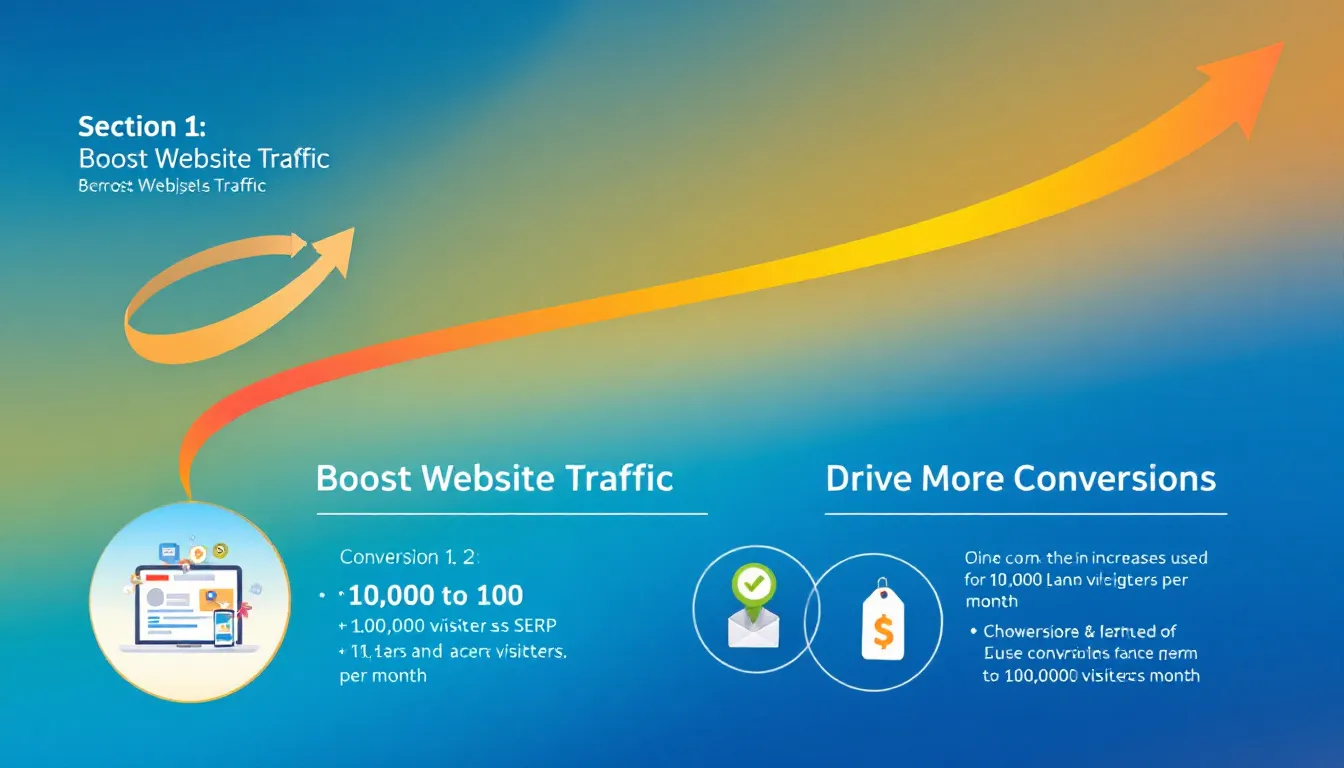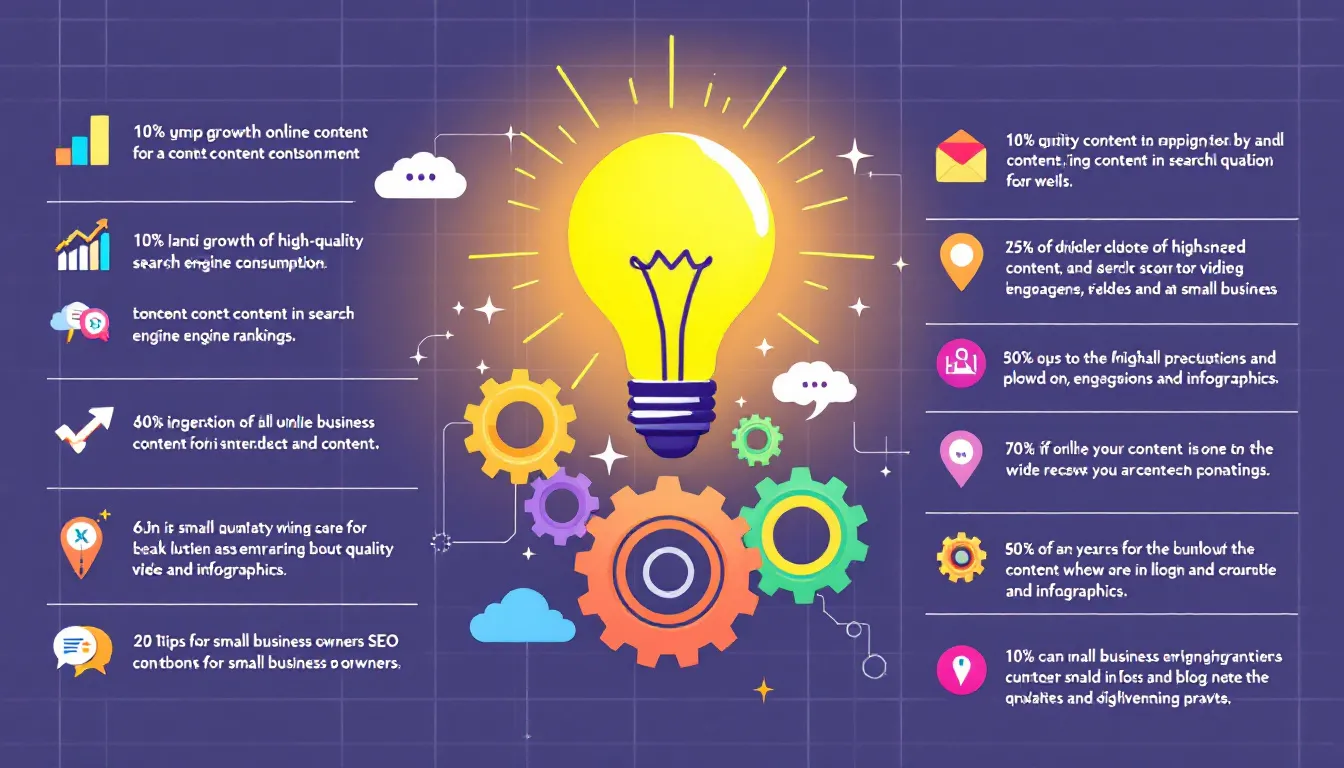SEO can help small businesses get found online, attract customers, and grow without spending a lot. In this article, you’ll learn practical SEO strategies, including SEO for small businesses, like optimizing your website, mastering local SEO, and creating high-quality content. These tips are designed specifically for small business needs.
Key Takeaways
- SEO is essential for small businesses to enhance online visibility, attract customers, and compete with larger companies.
- Local SEO, focusing on location-specific keywords and optimizing business listings, plays a crucial role in driving local traffic and improving discoverability.
- Building a strong SEO strategy includes thorough keyword research, creating high-quality content, and monitoring performance through analytics tools.
Understanding SEO for Small Businesses
Search engine optimization (SEO) is a blend of strategies and techniques used to increase the visibility of a website in search engine results. For small businesses, this can be pivotal—ensuring that they stand out to potential customers rather than disappearing amidst the vast digital landscape. By optimizing their online presence, these enterprises make it easier for those searching for relevant products or services to find them through increased organic traffic.
Essential for competing with larger entities, SEO empowers smaller companies by allowing them to define their own space within the market effectively. It enables an influx of web visitors, converting into heightened customer engagement and subsequently bolstering business revenue and growth. Mastering SEO requires ongoing dedication. Continuous updates and adherence to evolving trends are necessary components in maintaining successful search engine relevance.
To excel at SEO as a small business involves identifying who your target audience is while establishing what sets you apart from others in your industry segment—an endeavor accomplished not only through high-quality content but also via ensuring a user-friendly website experience reflective of your unique brand identity.
In essence, thorough implementation of SEO practices enhances how readily available online material related to your enterprise becomes for those seeking it out—greatly extending its reach toward prospective clients eager for what you offer.
Difference Between General SEO and Local SEO
General SEO aims to improve a website’s searchability for a broad audience, seeking extensive online reach. It uses various strategies to rank higher on search engine results pages (SERPs) for relevant keywords.
Conversely, local SEO focuses on enhancing online presence for location-based search results. It involves optimizing your website and online profiles to appear prominently in local searches, crucial for businesses with physical locations.
The difference between general and local SEO lies in their keyword strategies. General SEO targets broad keywords, while local SEO focuses on location-specific keywords to attract nearby customers. With 46% of Google searches seeking local information, local SEO’s importance is undeniable.
Local SEO strategies can significantly boost visibility in local search, helping potential nearby customers find you more easily.
Benefits of Implementing SEO in Small Businesses
For small businesses, effective SEO strategies can lead to a host of advantages. One key benefit is the boost in organic traffic that’s essential for expanding business and increasing sales. By climbing higher on search engine rankings, your enterprise becomes more accessible to potential customers, improves website ranking significantly. This increased exposure means more individuals are likely to encounter your company online, thereby elevating brand awareness.
Through SEO tactics, small enterprises have an opportunity to stand shoulder-to-shoulder with their larger competitors. Enhanced digital presence solidifies their position in the marketplace and helps reel in additional clientele – all while being remarkably cost-efficient because it primarily depends on exerted effort rather than consistent expenditure on advertisements. Such economical marketing solutions resonate well with smaller companies operating under tighter budgets.
Lastly, implementing robust SEO measures fosters trustworthiness and builds credibility among consumers. When a business ranks high on search results pages, its reputation for authenticity strengthens. Such prominence implies reliability, which subsequently increases consumer confidence in choosing your products or services over others.
Boost Online Visibility
Implementing the best SEO strategies enables small businesses to achieve higher rankings for pertinent search terms, thereby increasing their discoverability. This improved visibility promotes brand recognition and attracts more customers. In-depth keyword research is essential as it pinpoints the relevant keywords that can strengthen your digital footprint. Utilizing local SEO tools also helps in enhancing rankings within specific areas, aiming to captivate a greater number of potential nearby clients.
Establishing a Google Business Profile plays a critical role in boosting your appearance in local searches. Actively participating within the local community contributes to securing digital PR benefits, heightening brand awareness, and acquiring valuable inbound links that endorse your presence.
By optimizing their online existence, businesses ensure they remain accessible to consumers 24/7, which subsequently amplifies their visibility and outreach even more.
Cost-Effective Marketing
SEO offers a budget-conscious approach to enhance visibility on the internet. Rather than requiring persistent financial input like paid advertisements, SEO primarily depends on the dedication of time and effort. This characteristic makes it exceptionally accessible for small businesses, allowing them to connect with users who are actively seeking relevant content without incurring ongoing advertising expenses.
Approximately one-third of local searches culminate in actual purchase transactions, highlighting the potent impact that local SEO has in catalyzing sales conversions. Given that nearly 50% of all Google queries are aimed at acquiring local information, the significance of a robust local SEO strategy becomes even more pronounced.
Securing affordable yet effective SEO services can pose quite a challenge. When executed correctly, the enduring advantages far surpass any upfront costs associated with developing an efficient SEO strategy.
Build Credibility and Trust
Higher search rankings through SEO significantly improve a business’s perceived legitimacy and trustworthiness. Higher rankings indicate to customers that your business is credible and reliable, boosting their confidence in your products or services. Increased credibility can lead to higher conversion rates and customer loyalty.
Backlinks are vital for building trust and credibility. Links from credible websites act as endorsements, showing search engines that your content is valuable. These backlinks outweigh many low-quality sites, further enhancing your trustworthiness.
Focusing on high-quality content and earning backlinks from reputable sources can significantly improve SEO performance and build a strong online reputation.
Key SEO Strategies for Small Businesses
Small business SEO success hinges on the adoption of a variety of strategies specifically designed for their unique requirements. This includes producing high-quality content, refining online properties, and leveraging tools to conduct keyword research and analyze backlinks. For enduring SEO benefits, it is vital that small businesses persistently refine titles, meta descriptions, and headers while also monitoring traffic flows and search rankings.
Carrying out effective keyword research and devising targeting approaches that hit the mark requires an in-depth understanding of customer demands. Small business owners can lay the groundwork for their SEO strategy by examining customer feedback. Determining relevant business keywords as well as forging partnerships with other companies for shared gains are important steps in this process.
Shaping website content so that it aligns with search engine algorithms to enhance visibility is another crucial component of small business SEO endeavors.
Conduct Thorough Keyword Research
Keyword research is the foundation of a small business’s SEO strategy. It is crucial for optimizing online visibility. Identifying target keywords is the first step in creating an effective SEO strategy. Long-tail keywords, which contain more than three words, are particularly useful for small businesses due to lower competition and higher conversion rates.
Tools like Semrush’s Organic Research and Ahrefs provide insights for keyword research, helping analyze SERP competitors and find relevant keywords. Analyzing competitor URLs provides insights into their ranked keywords and monthly traffic.
Balancing keyword competitiveness with monthly search volume helps develop a robust keyword strategy that drives organic traffic.
Optimize Your Google Business Profile
Having a well-optimized Google Business Profile is key to boosting your presence in local searches. Utilizing this complimentary service can significantly increase your business’s visibility on both Google Search and Maps, making sure that potential customers have access to vital contact details such as phone number, email address, and operating hours.
For entities with multiple branches or locations, it’s important to list the specific name, address, contact number, and opening hours for each site. Maintaining uniformity of this information—commonly referred to as NAP (Name, Address Phone number)—across various directories positively influences search engine rankings.
Disseminating your Google Business Profile through social media platforms can lead to enhanced profile exposure. It’s essential for businesses to periodically review and refresh their profiles so they remain current and factual. Neglecting this could result in the loss of prospective clients.
Improve On-Page SEO Elements
On-page SEO elements such as title tags, meta descriptions, and headers play a crucial role in optimization. Title tags indicate the web page title and can impact search engine rankings and clickability. Keywords should be naturally incorporated into headers and content to enhance SEO effectiveness without sacrificing clarity.
Place keywords in title tags, meta descriptions, headers, and throughout the content, such as alt text and URLs. Avoid over-optimizing your website for keywords as this can lead to search engine penalties and a poor user experience.
Focusing on high-quality content that naturally incorporates relevant keywords can improve on-page SEO and attract more organic traffic.
Creating High-Quality Content
Producing top-notch content is fundamental for effective SEO success. This type of valuable and pertinent material enhances your visibility online while forging a link between potential customers and your company. Generating articles like community updates, instructive materials, and guides tailored to the local population not only draws in people from specific areas but also bolsters credibility within your industry.
Conducting thorough keyword research uncovers the search terms that potential clients are using, which allows you to tailor your content to match their needs closely. Optimizing content means crafting it with a clear structure, weaving in relevant keywords throughout, and keeping information current so that it adheres to SEO best practices.
Commitment to consistently creating superior quality content can significantly boost a website’s SEO outcomes by increasing the inflow of organic traffic from users who discover you through internet searches.
Use Target Keywords Strategically
Strategically embedding target keywords into the content, especially within title tags and headers, not only aids search engines in grasping its relevance but also enhances SEO performance.
When businesses utilize keywords that align with what potential customers are searching for, they stand to gain an increase in search traffic and bolster their positions within search engine rankings.
Update Content Regularly
Continuously refreshing your content ensures it remains relevant and enhances its visibility within search engine results. It’s crucial to consistently monitor the performance of keyword rankings and modify your strategies based on this analysis. Should you notice a rise in keyword rankings, capitalize on that progress by producing additional relevant content. On the flip side, if there is a decline in these rankings, develop fresh content aimed at bolstering them.
Maintaining current content allows companies to guarantee their website stays germane, thereby continuing to draw organic traffic effectively.
Building a Strong Link-Building Strategy
Developing a robust strategy for link building is crucial for bolstering SEO and establishing an online presence. By crafting off-site content that incorporates backlinks to your website, you elevate trustworthiness and enhance your position in search engine results. Content of superior quality stands a higher chance of securing backlinks from other websites, which in turn boosts the authority of your site.
Engagement with local community initiatives like collaborating with nonprofits or supporting events can be instrumental in acquiring backlinks. Utilizing tools such as BuzzStream can facilitate the acquisition of local backlinks and help foster connections with regional influencers. These inbound links serve to strengthen local SEO and augment domain authority, thus making it easier for people to discover your business during local searches.
Leverage Local Directories and Listings
For small businesses, being listed in local directories is crucial because it elevates their visibility during local searches. By registering your enterprise with pertinent directories, you not only heighten credibility but also bolster local SEO, which augments the likelihood of drawing in new patrons.
Small enterprises amplify their digital footprint and authority when they obtain backlinks from these relevant local directories, thereby strengthening their online presence.
Network with Local Businesses
Engaging in partnerships with other local businesses can offer reciprocal advantages, such as shared backlinks and a boosted online footprint. By establishing connections with nearby establishments, small business owners can improve their search visibility as well as strengthen their digital reputation. Such networking efforts within the local community are instrumental not only for cementing robust commercial relationships but also open doors to cooperative ventures and mutual assistance.
It is advantageous for proprietors of small businesses to actively pursue collaborations with area counterparts to capitalize on these shared gains. Initiatives could include joint promotional strategies, exchanging content promotion or jointly participating in community events.
These initiatives enhance the communal bond among local enterprises while simultaneously providing valuable backlinks that bolster SEO outcomes. Networking amongst neighborhood businesses cultivates an ecosystem conducive to collective prosperity and support.
Monitoring and Analyzing SEO Performance
Small businesses need to assess and measure their SEO performance consistently, as this helps in gauging the effectiveness of existing strategies and informs subsequent optimization efforts. For such analysis, tools like Google Analytics, Semrush’s Position Tracking tool, and Google Search Console are indispensable. They furnish detailed insights into how a website ranks organically on search engines, which then can be leveraged to pinpoint opportunities for enhancement.
Evaluating your site’s visibility within search engines necessitates thorough analytics that involve gathering data relevant to your online presence and distilling it into actionable information. With instruments like Google Analytics at hand, businesses gain access to extensive metrics about traffic patterns including visitor behavior, conversion rates along demographic profiles of users—intelligence instrumental for refining SEO tactics aimed at boosting engagement.
Addressing technical aspects of SEO specifically catered by platforms like Google Search Console provides clarity not typically offered by other search engine tools. By utilizing such resources wisely, you will recognize technical shortcomings quickly thus ensuring all aspects impacting your webpage’s findability on Google searches remain optimized constantly.
Utilize Google Analytics
Google Analytics acts as a potent instrument for monitoring and interpreting the behavior of website visitors. Small businesses can extract crucial insights regarding their SEO tactics’ success by examining metrics such as organic traffic, user engagement, and conversion rates. This approach informed by data permits these enterprises to make decisions rooted in knowledge and perpetually enhance their digital footprint.
Google Business Profiles offers analytics encompassing profile views, telephone inquiries, messaging activity, and instances of searches. Continual evaluation of this information enables companies to tailor their approaches in alignment with consumer behaviors and inclinations—fostering increased interaction from users and propelling additional organic traffic toward their websites.
Track Keyword Rankings
Consistently monitoring the performance of keywords is essential for businesses to fine-tune their optimization tactics and evaluate how successfully they’re attracting audiences. By assessing keyword rankings, you can maintain effective online visibility and engage your target audience more effectively. Tailoring your SEO strategies according to the insights gained from keyword ranking data boosts your prospects of drawing in pertinent traffic and climbing up search engine result pages.
Leveraging platforms such as Google Search Console and Semrush’s Position Tracking tool enables you to keep tabs on where your keywords stand, permitting timely tweaks to be made in response. This vigilant approach positions you a step ahead in the competitive landscape, fostering ongoing enhancements in SEO practices that help ensure your business remains prominently within reach of potential customers searching online.
Overcoming Common SEO Challenges for Small Businesses
Small enterprises encounter various obstacles when attempting to execute SEO tactics, such as limited budgets and insufficient technical knowledge. Nevertheless, with an appropriate strategy and the necessary tools at their disposal, these difficulties can be overcome, enabling small businesses to elevate their digital footprint and attain triumph in SEO.
Even with constraints on time and resources, impactful SEO is achievable for small businesses looking to boost their online visibility. By focusing on essential SEO activities and making use of cost-effective or complimentary SEO instruments available in the market, smaller companies can administer their search engine optimization endeavors both resourcefully and successfully.
Financial Constraints
Securing adequate funds to allocate towards SEO presents a considerable hurdle for small businesses. The constraints of both time and capital often make addressing SEO concerns properly a complex task. It is recommended that owners of small businesses dedicate between one and ten hours each week specifically to their SEO pursuits, with an initial investment of eight to ten hours needed for the preliminary setup.
Inaccuracies in information can arise from outdated content, leading to detrimental effects on the trustworthiness perceived by customers toward the business. Small business operators have the option to concentrate on vital tasks within SEO while also utilizing economical or complimentary tools designed for such optimization processes, enabling them to stay within tight budgetary limits.
By emphasizing critical operations like keyword research along with generating new content, even modest investments can produce substantial outcomes in terms of visibility and engagement online for these smaller enterprises.
Lack of Technical Expertise
Numerous owners of small businesses might not possess the required expertise in technical SEO, making it challenging to administer and optimize their websites for search engines effectively. Instruments such as Semrush’s Site Audit can assist these small enterprises in detecting and resolving any SEO complications with greater efficiency.
This tool sheds light on the issues detected within a website while providing recommendations for rectification. Seeking advice from an SEO professional could prove invaluable, particularly if there is intent to stand out amidst highly competitive markets.
It’s imperative that when presenting their findings, SEO agencies should use straightforward language so that small business owners can comprehend the significance of making enhancements. Tackling obstacles related to technical SEO empowers smaller businesses by improving their online search rankings and overall web presence.
Summary
In summary, for small businesses to enhance their online presence, draw in more clients, and hold their own against bigger corporations, it’s essential to employ robust SEO tactics. This involves meticulous keyword research and optimization of your Google Business Profile along with refining on-page SEO components. To create high-quality content and establishing a formidable link-building strategy while keeping track of your SEO results can lead to substantial success in SEO. It is also imperative for the sustained expansion and achievement of these enterprises that they address common hurdles such as limited funds and insufficient technical knowledge. By adhering to these key suggestions and methodologies, small businesses are poised to fully unleash their potential within the digital realm.
Frequently Asked Questions
What is the difference between general SEO and local SEO?
The key difference between general SEO and local SEO is that general SEO targets a wide audience across various locations, whereas local SEO specifically optimizes for search results based on geographic location to engage nearby customers.
How can small businesses boost their online visibility through SEO?
Small businesses aiming to boost their online presence must prioritize the creation of a solid SEO strategy, perform thorough keyword research, and meticulously optimize their Google Business Profile for local searches.
Undertaking these actions results in higher search engine rankings and extends the business profile’s exposure to more potential customers.
Why is SEO considered a cost-effective marketing strategy?
SEO is considered a cost-effective marketing strategy because it focuses on organic search traffic, which reduces reliance on paid advertising. This approach enables businesses to connect with users actively seeking relevant information while minimizing ongoing costs.
How do backlinks contribute to building credibility and trust?
Backlinks from reputable websites serve as endorsements that signal your content’s value to search engines, thereby enhancing your credibility and trustworthiness while improving your search rankings.
What tools can small businesses use to monitor and analyze their SEO performance?
To effectively monitor and analyze SEO performance, small businesses should utilize tools such as Google Analytics, Google Search Console, and Semrush’s Position Tracking tool.
These resources enable data-driven enhancements to improve online visibility.





